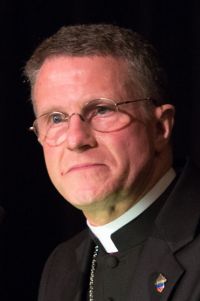By TOM TRACY
CATHOLIC NEWS SERVICE

Archbishop Timothy P. Broglio of the Archdiocese for the U.S. Military Services, addresses the Thomas More Society of South Florida April 23 about religious freedom and the military chaplaincy following the annual Red Mass at St. Anthony Church in Fort L auderdale. (CNS photo/Tom Tracy)
FORT LAUDERDALE, Fla. (CNS) — Catholic military chaplains continue to enjoy sufficient freedom and standing to carry out their ministry, the head of the Archdiocese for the Military Services told a group of legal professionals.
Archbishop Timothy P. Broglio said during an address April 23 to 200 Catholic judges, lawyers and elected officials at the annual awards ceremony of the St. Thomas More Society of South Florida that the armed services recognize and support religious freedom and the free exercise of religion by U.S. servicemen and servicewomen worldwide.
“While my appointment was made by Pope Benedict XVI, the role is respected by the military, and the parameters I set for the practice of the Catholic faith are those recognized by the military hierarchy,” he said. “For a priest to become a chaplain or to fulfill the responsibilities of a contract of a Catholic priest, he must have my endorsement.”
Despite what some might hear, he added, what a priest, rabbi or minister does in the context of a religious service is determined by his or her faith group. “That there are religious services is a command responsibility; what happens during them is the province of the faith group,” he added.
“Generally, I would consider the relations with the armed forces and the military hierarchy good. There is no real difficulty in seeing or speaking with the highest levels in the military or with base commanders,” he said.
Archbishop Broglio noted that Catholics constitute the largest faith group of the 244 religious communities recognized by the U.S. armed forces.
[hotblock]
“My position is respected by most of the other confessions, even if occasionally there might be a bit of envy for the treatment accorded me,” the archbishop said. “Our services, religious education programs and other activities generally have the best attendance. We also have something to share with others, not in terms of proselytism, but in terms of a world view and a certain expertise in humanity.”
However, the archbishop admitted to facing major challenges. Among them, he cited the need to ensure that there are enough priests to minister as military chaplains — something he described as difficult — and to advocate that Catholic priests be accorded the same considerations given to other professionals, such as medical personnel.
He said he must advocate at times that Catholics in the armed forces not be subjected to “being saved” by others. He also works to ensure sufficient funding for core aspects of Catholic ministry, including reception of the sacraments, religious education, sacramental preparation and enrichment of adult communities.
“In those instances, I always find it helpful to remind others that the Constitution guarantees freedom of religion and not merely freedom of worship, and they are two very different things. Sometimes that distinction obliges me to explain the parameters of the Catholic program or to argue for the funds and provisions necessary to make that freedom of religion a reality and not merely a platitude,” the archbishop said.
In the seven years he has served with the archdiocese for the military services, the question most often asked of is, “Is it true that priests cannot use the name of Jesus?” The answer is, he said, “No, it is not true.”
“It only becomes an issue if he is praying at some action which is not a religious function, such as a change of command, night prayers on a ship or at a promotion ceremony. There he must be, in the words of St. Paul, ‘All things to all people’ and to include all,” he said.
In addition to Archbishop Broglio, the archdiocese has four auxiliary bishops. The prelates and chaplains serves more than 1.8 million people at 220 military installations in 29 countries, 153 Veterans Administration medical centers and federal employees serving outside of the U.S. including ambassadors, diplomats and contractors.
PREVIOUS: Catholics to press nuclear weapons ban at U.N. treaty review conference
NEXT: Charlotte Catholic church will not host talk by Sister Jeannine Gramick



Share this story